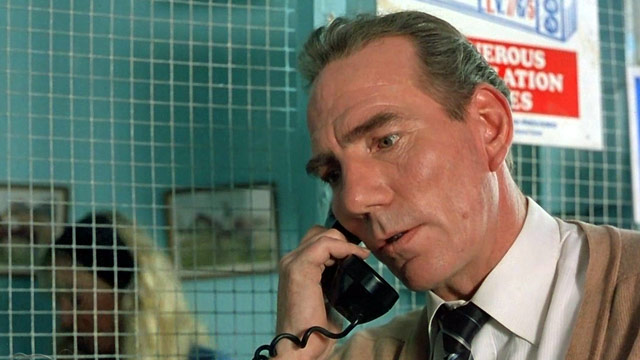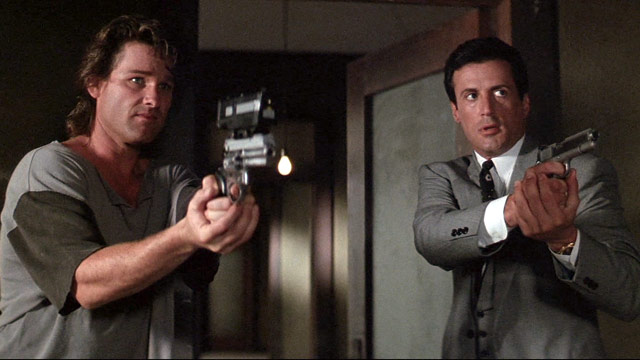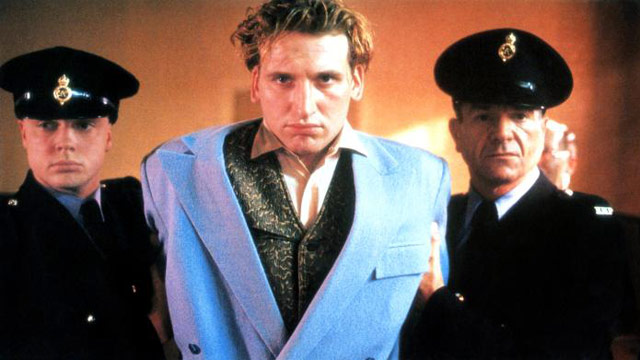
Jim Sheridan‘s hardcore biography film tells the story of Gerry Conlon (Daniel Day-Lewis), a volatile Belfast youth and member of the Guildford Four, four people falsely convicted of the Irish Republican Army’s Guildford pub bombings, which killed five people (four of which were off-duty British soldiers). The UK’s increased anti-terrorism laws passed in the early 1970s allow British intelligence to keep Conlon under lock and key for seven days, during which they torture a confession out of him; he and his three “colleagues” are subsequently imprisoned, as is Conlon’s father, Giuseppe (Pete Postlethwaite), who was convicted for assisting in the bombings on the basis of unsubstantiated nitroglycerine traces. In prison, Conlon turns from a bitter rabble-rouser to an impassioned political crusader; after Giuseppe dies, he stops at nothing to clear his father’s name, assisted by a British lawyer (Emma Thompson) who had been investigating the case in the wake of public campaigns demanding the release of the accused. Of the three collaborations between Day-Lewis and director Sheridan, this middle child is the best (flanked by My Left Foot in the past and The Boxer in the future), a scrappy Irish drama with a lot of fight in it; the film earned seven Oscar nominations, including Best Picture, Best Director, Best Actor (Day-Lewis), Best Supporting Actor (Postlethwaite), Best Supporting Actress (Thompson) and Best Director (Sheridan), Best Adapted Screenplay and Best Editing.

Kids, don’t be like Claire Danes and Kate Beckinsale — there are better (and safer) ways to celebrate your high school graduation than going off to “live dangerously” in some foreign country. Alice (Danes) and Darlene (Beckinsale) decide to trade Hawaii for Thailand at the last minute, where they hook up with a good-looking Australian dude who invites them to meet up with him later in Hong Kong; at the Bangkok airport, the girls are arrested for having heroin in their backpacks (that son of a bitch!) and are quickly sentenced to 33 years in prison in a country that doesn’t believe in parole. As their friendship deteriorates at a hellhole women’s prison known as the “Brokedown Palace” (yes, named after the Grateful Dead song), their case is investigated by a crusading American lawyer, Hank ‘The Yank’ Greene (Bill Pullman), who takes on a corrupt political system as he attempts to prove the girls were framed. Brokedown Palace tries (so hard) to be gritty, though it never quite makes you forget that there’s a whole team of makeup artists just out of the camera eye who are waiting to swoop in once director Jonathan Kaplan calls “cut” so they can make sure Claire and Kate have just enough dirt and grime on their faces; Pullman is great, though, working his charming-twitchy magic as a legal fish out of water. The film became the subject of some controversy after Danes described Manila, where the film was shot, as a “ghastly and weird city” that “smelled of cockroaches, with rats all over and there is no sewage system and the people do not have anything – no arms, no legs, no eyes.” Kim Atienza, son of then-Mayor of Manila, Lito Atienza, just loved that (as did the likes of Oprah Winfrey, Tom Hanks, Bruce Willis and Danes’ co-star Lou Diamond Phillips); Joseph Estrada, then-President of the Philippines, went on to declare (or is that “De-Claire?”) her persona non grata.

“Rambo… is a pussy.” Believe it or not, meta-humor was not only possible but was also practiced in 1989, and Tango & Cash is more than just a collection of witty self-references made by Sylvester Stallone; the entire movie seems like one big joke as the guy who played Rocky/Rambo and the guy who played Snake Plissken (Kurt Russell to you) are paired as rival LAPD narcotics detectives (you can tell Stallone’s the uptight one because he wears glasses and perfectly pressed suits) who are forced to work together after notorious criminal mastermind Yves Perret (Jack Palance, even hammier than he was earlier that year in Tim Burton’s Batman) frames them for the murder of an FBI agent. In prison, a maximum-security hellhole, they’re of course confronted by a lot of the scumbags they respectively put away over the years, including Perret’s right-hand man, Requin (go-to thug Brion James); after they escape with a little help from the warden, they set out to clear their names, a process that involves Russell dressing up in drag and sort-of romancing Teri Hatcher, who plays Stallone’s conveniently single sister. Tango & Cash is freakin’ ludicrous, but it’s got a big ol’ dumb heart and an even bigger sense of humor; an ’80s action film that’s so aware of its own absurdity is a rare bird — and a rare treat — indeed.

Errol Morris’ excellent documentary focuses on the 1976 murder of Dallas police officer Robert W. Wood during a traffic stop, a crime for which the police department couldn’t make an arrest until they confronted David Ray Harris, a 16-year-old resident of Vidor, Texas who had bragged to his friends about committing the deed. Harris actually went on to identify Randall Dale Adams, a 28-year-old Ohio native living in a Dallas motel with his brother, as the murderer; Adams’ subsequent arrest and imprisonment prompted one of the most controversial incidents of wrongful imprisonment in American history, with Adams’ attorneys famously suggesting that Adams was convicted over Harris simply because the death penalty couldn’t be enforced on a minor. The Thin Blue Line presents a bizarre situation that becomes more infuriating as it unfolds; Adams’ case was actually re-reviewed after the film came out in 1988, which resulted in him being released from prison about a year later. The title comes from the prosecutor’s closing argument, in which he says the police are the “thin blue line” separating society from anarchy — as you can probably tell, the film suggests this is a very thin line indeed. And speaking of outrageous injustices, Line won several awards, except for the really big one — since it was being marketed as “nonfiction” rather than a “documentary,” it was disqualified from being considered for an Oscar. Huh?

Peter Medak’s fascinating crime drama tells the true-life story of Derek Bentley (Christopher Eccleston), a slow-witted teenager in 1950s England who falls in with a small-time group of criminals led by 16-year-old Chris Craig (Paul Reynolds). It was Craig who shot police constable Sydney Miles during a burglary attempt (a crime for which he spent ten years in prison), but it was Bentley who hanged for it in what the film’s tagline refers to as an “unbelievable miscarriage of justice” — Bentley’s alleged cry of “Let him have it, Chris!” before Craig opened fire was interpreted as “mentally aiding in the murder” by the prosecution, whilst the defense unsuccessfully argued that it was a plea to give the police officer the gun (and thus surrender). Bentley’s conviction and execution led to a 45-year-long campaign to win him a posthumous pardon (often spearheaded by Bentley’s sister, Iris), which was granted partially in 1993 and then completely in 1998. A companion piece of sorts to The Thin Blue Line, Let Him Have It is a powerful piece of work that criticizes a flawed and misguided British legal system, with Eccleston giving an excellent performance long before he would become one of the most memorable incarnations of Doctor Who. Peter Medak replaced original director Alex Cox (Sid and Nancy), who wanted to shoot the film in black & white.